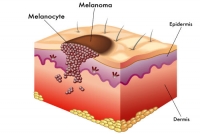The Benefits Of Phytonutrients In Combatting Melanoma And Fibrosarcoma
Phytonutrients are natural compounds produced by plants for their protection. They help plants repel harmful insects, protect them from diseases, draught, ultraviolet rays, and pollutants. Until recently phytonutrients were not considered as important nutrients for humans; however, they are now thought to be necessary to sustain human life. Some examples of common phytonutrients are curcumin (which is an active component in turmeric), resveratrol (which is found in peanuts, pistachios, grapes, red and white wine, blueberries, and cocoa and dark chocolate), and quercetin (which is an active component present in red onions, apples, and peppers). It has been shown that several of these phytonutrients present in fruits and vegetables can reduce the incidence of chronic diseases such as diabetes, hypertension, atherosclerosis, and cancer.
The Dr. Rath Research Institute recently published a study using a combination of phytonutrients (green tea extract, curcumin, resveratrol, quercetin and a mixture of extracts from the cruciferous vegetables cabbage, cauliflower, carrots and broccoli) on melanoma skin cancer and fibrosarcoma cells.* The experiments were based on understanding key mechanisms of cancers which included cell multiplication, invasion of the basement membrane, and metastasis (the spread of the cancer).
Skin cancer is the most common of all types of cancers in the USA and other developed countries. It is estimated that one in five people will develop skin cancer in their lifetime. While melanoma is less common than other types of skin cancers, it is the most feared skin cancer because of its aggressiveness. In 2016 about 76,380 new melanoma cases were diagnosed and 10,130 people were expected to die of melanoma.
Fibrosarcoma is another aggressive cancer primarily developing in the ends of the long bones of the arms and legs. Due to the growing phase of the long bones, fibrosarcoma is common in children, adolescents, and young adults. Fibrosarcoma is highly malignant and rapidly spreads to other organs. According to the American Cancer Society, approximately 12,310 new cases of soft tissue sarcomas (including fibrosarcoma) were estimated to be diagnosed in 2016, and close to 5,000 people were expected to die due to this disease.
In our study, we saw that the specific phytonutrients had significant inhibitory effects on melanoma and fibrosarcoma cells. Matrix metalloproteinases (MMP) are the enzymes that cancer cells use to spread. The phytonutrients completely blocked the MMP enzymes in both melanoma and fibrosarcoma cell lines. Consequently, the cell migration was 100% inhibited. Moreover, the phytonutrient combination also helped in stopping the growth of melanoma and fibrosarcoma cells up to 80%.
Although surgery, chemotherapy and radiotherapy are available as current cancer treatments, they do not cure cancers. More than 90% of all cancer deaths occur due to the metastasis of cancer. Therefore focusing on stopping the metastasis is a critical step in addressing cancer. Phytonutrients, similar to other essential micronutrients, have a variety of anti carcinogenic properties and have immense potential to address critical steps in the development and spread of cancer.
*MW Roomi, et al., Journal of Cellular Medicine and Natural Health, 2017
